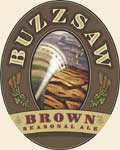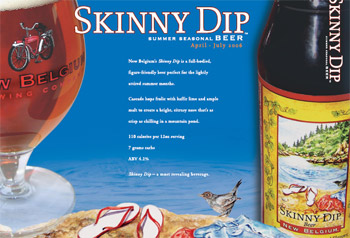Pardon the length of this post, but here is a letter sent to the president, vice president, and other board members at Anheuser-Busch Inc.
There’s also an online petitition to save the brewery.
To Whom It May Concern:
It was on Friday May 19, 2006, when I received a phone call from my father Richard Pavlik, who is a 22 year long employee of Latrobe Brewing Company, when I got the news. “The label was bought by Anheuser-Busch for $82 million.†I quickly asked about the future of his job in which he replied, “I have 60 days then I no longer have a job.†Immediately I broke down in tears for many reasons, one of which was my concern for the well-being of my parents and the effect this job loss will have on their lives. I have to admit that along with my sadness, I was very angry. “How could someone do this to, not only my father and the other 200+ employees of Latrobe Brewing Company, but to a whole community whose livelihood revolved around their pride and commitment to Latrobe Brewing Company-more specifically Rolling Rock beer.â€
Despite my anger, I understand that Anheuser-Busch’s purchase of Rolling Rock was a decision based on business. However; I feel that this decision was made without an understanding of the devastating impact that the removal of Rolling Rock would have on the people of Latrobe and the surrounding communities. In addition, I feel that Anheuser-Busch may not have thought enough about how keeping Rolling Rock in Latrobe could help their own company from a business standpoint.
Ever since the announcement of Anheuser-Busch’s purchase of Rolling Rock and the plan to move it out of Latrobe, it’s as if a large dark cloud has settled over Latrobe. Not only has this decision gloomed the employees of Latrobe Brewing Company, but it has gloomed those who are also committed to the greatness that Rolling Rock brings to Latrobe. It feels as if someone took something so important out of our lives that we can never get back. I know that I am speaking for everyone who has pride in Rolling Rock when I say that we are truly hurt and devastated for this loss.
I found a noteworthy quote in an article dated March 30, 2006 from Anheuser-Busch. This article was titled ‘Who Would You Have A Beer With?’ Robert C. Lachky, executive vice president, global industry development, Anheuser-Busch Inc. is quoted saying that “Beer is about sharing moments and creating memories with good friends and family.†This quote could not be truer. Rolling Rock beer has allowed us to create these memories with our friends and family here in Latrobe. Though these moments and memories cannot be taken away, the opportunity to create more of them with our loved ones has been.
After Anheuser-Busch’s purchase of Rolling Rock, Mr. August A. Busch IV, president of Anheuser-Busch Inc. hit the nail head on when he was quoted for saying, “We have an ideal opportunity to grow this historic brand. This beer is not like others, and it’s consumer following is EQUALLY DISTINCTIVE.†It is apparent that Mr. Busch and other’s in Anheuser-Busch see Rolling Rock for what it is and for what THE PEOPLE OF LATROBE have made it. While Anheuser-Busch may be able to brew Rolling Rock beer using the same “time-honored†recipes, it is virtually impossible to replicate the committed employees of Latrobe Brewing Company and people of Latrobe, which go hand-in-hand with Rolling Rocks craftsmanship and heritage.
The history of Anheuser-Busch states that in 1864, Adolphus Busch joined the fledgling brewery that later became known as Anheuser-Busch. Though the early years were demanding, Mr. Adolphus Busch continued to have a keen vision for the success of the company. The history further indicates that the distinctive contributions made by each succeeding generations of the Anheuser-Busch family clearly show that the history of Anheuser-Busch isn’t a story about a company-it’s a story about people. People with dreams and perseverance. Like Anheuser-Busch, the story and history of Rolling Rock is not a story about a company, but a story about people. The Tito brother’s wanted a unique beer that could represent the heart and soul of Latrobe. As a result, Rolling Rock beer was introduced in 1939 and since that time, it has become more than a beer and a product of a company. Rolling Rock indeed became the heart and soul of the people of Latrobe. Telling someone that “I’m from Latrobe†is accompanied with an enormous sense of pride.
August Busch Sr.’s vision and determination to keep his company going during the Prohibition resembles the vision of the Latrobe Brewing Company employees and the people of Latrobe. We are determined to keep producing Rolling Rock beer in Latrobe where it belongs. History reports that August Busch Sr. was able to keep many of his skilled workers employed and his equipment up to date during the difficult time of the Prohibition. Obviously, he was able to see the importance of dedicated and skilled employees. I feel August Busch IV would be proud to employ the current workers at Latrobe Brewing Company. They are, indeed, highly skilled and committed to producing Rolling Rock. It is important to note that there has not been a labor dispute at the Latrobe Brewing Company in over 24 years. This is a clear indication of the dedication and loyalty of the employees in this establishment. Also during the Prohibition, Mr. Busch Sr. kept his equipment up to date. Likewise, recent additions and modifications to the equipment at Latrobe Brewing Company have been made to keep up with the demand of the highly sought after Rolling Rock beer in this competitive field.
After researching Anheuser-Busch’s history and values, I feel that a partnership with Rolling Rock, if kept in Latrobe, can be more beneficial for Anheuser-Busch as a company. The employees at Latrobe Brewing Company have these same values and commitment to the product that they make here.
Anheuser-Busch is known for, and prides itself, for their unique commitment to their belief statement, mission, and values. In fact, the Anheuser-Busch web-site relates that these values are “a concern for people, communities, and the environment.†I am asking that you please follow these values and show your support for our people and our community whose lives and passion revolve around having Rolling Rock Beer brewed in Latrobe. Please rethink your decision of taking the pride and passion out of our lives.
Anheuser-Busch Companies, Inc. Statement of Beliefs includes the following belief: The understanding that well-trained and motivated employees acting with the highest integrity are critical to our success. As a former part-time seasonal employee at Latrobe Brewing Company, I have witnessed first hand how the employees making Rolling Rock beer contribute to the company’s success through the dedication and pride the employees have in their jobs and the product they produce. I’ve also witnessed this dedication from retiree’s, such as Albert Pavlik my grandfather, who is a 35 year veteran of Latrobe Brewing Company.
Finally, The Vision of Anheuser-Busch states: Through all of our products, services and relationships, we will add to life’s enjoyment. We dedicated consumers of Rolling Rock beer and the employees of Latrobe Brewing Company understand how the product adds to life’s enjoyment. Please allow us to work together in Latrobe to accomplish the vision of Anheuser-Busch.
I sincerely thank you for your time,
Christina M. Gumola
Proud daughter of
Richard L. Pavlik-Employee of Latrobe Brewing Company

 BuzzSaw Brown. Deschutes Brewery calls its newest seasonal “an easy-drinking beer that is refreshing after a hard day’s work.” A modest 4.8%, it qualifies as something of a session beer but has a soothing restorative quality. Packed with a full range of deep rich flavors and brimming with nutty roastiness. Gentle bitterness nicely balances the caramel sweetness. 4.8%, 30 IBU.
BuzzSaw Brown. Deschutes Brewery calls its newest seasonal “an easy-drinking beer that is refreshing after a hard day’s work.” A modest 4.8%, it qualifies as something of a session beer but has a soothing restorative quality. Packed with a full range of deep rich flavors and brimming with nutty roastiness. Gentle bitterness nicely balances the caramel sweetness. 4.8%, 30 IBU.